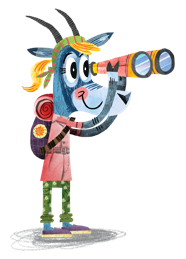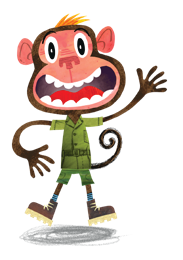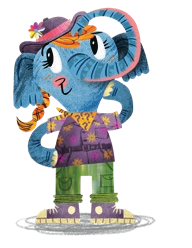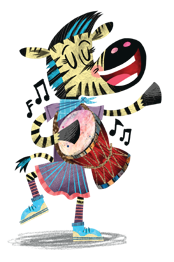Exodus
1:15–22
Shiphrah and Puah were heroines. They were Israelite midwives who helped mothers when their babies were born. Pharaoh wanted them to kill the new born baby boys. But they refused to do it. They saved many baby boys’ lives.
2:10
Moses’ name means “draw out.” That is because Moses was picked up out of the water. Moses is one of the most important people in the Bible. He grew up in Pharaoh’s palace. Moses was treated like a prince. Later he became a shepherd in the desert. While in the desert, the Lord called him to save his people from Pharaoh. He was the Israelites’ most important leader. Moses led the Israelites from Egypt to the land God promised them. He also gave them God’s laws.
3:1 (Greeny)
Greeny likes to hike in the mountains. Mount Horeb was another name for Mount Sinai. Mount Horeb was the place where God spoke to Moses in a burning bush. This is also the mountain where God gave Moses the Ten Commandments and other laws. The highest mountain in the world is Mount Everest. What’s the highest mountain in your country?
7:14–17
Pharaoh refused to let the people go. So the Lord sent ten plagues or disasters on Egypt. The plagues showed Pharaoh and the Egyptians that God was stronger than their gods. Each plague targeted one or more of the Egyptian gods. The plagues also showed the Israelites that God has all the power. The Israelites also saw that Moses was showing God’s power to Pharaoh.
7:8–12
Moses and Aaron went to Pharaoh. Then amazing things started to happen. Talky suggests you do a role play of this event with some friends. Decide who will be Moses, Aaron, Pharaoh and the magicians. Remember the walking sticks and snakes!
Do you think your sticks will turn into snakes?
Talk with your group about what happened to the sticks in the story and why it happened. Talk about everything the Lord showed Moses, Aaron and Pharaoh.
8:1–15
The Egyptians thought frogs were holy animals and never killed them. They believed that frogs brought good harvests and many children! They even had a female god named Heqet who had the head of a frog. The Lord sent so many frogs that they went into the people’s homes. After a while, they died. Then the frogs lay in piles everywhere and the land began to smell.
9:13–14
After the sixth plague, the Lord sent a special message to Pharaoh. God warned Pharaoh that the next plagues were going to be very bad. This would show Pharaoh and all the Egyptians that the Lord has power over all their Egyptian gods, Nut, Osiris and Ra. Locusts showed that God was more powerful than the Egyptian gods of harvest. Darkness showed that God was more powerful than Ra, their sun god, Ra had no power when the Lord stepped in.
10:20, 27 (Thinky)
Thinky reads that the Lord made Pharaoh stubborn after the eighth and ninth plagues. The Lord gave Pharaoh seven chances to let the people go. After that, the Lord didn’t give Pharaoh any more chances. He sent the last three plagues to show Pharaoh, once and for all, that he has the power over all things. The Lord can change a stubborn heart into an obedient heart. The Lord can even change the heart of a stubborn ruler.
12:21–28
This was the first time that the Israelites celebrated the Passover. In preparation, God told the Israelites to kill a lamb. They had to smear its blood on the doorframes of their homes. This was a sign that they believed in the Lord. When the Lord saw the blood on the doorframe, he didn’t allow the destroying angel to enter that home. All the people inside the house were kept safe. But in the homes of the Egyptians, the eldest son died. The firstborn of all their animals died. Since that day, the Jews have celebrated the Passover every year. It reminds them of the day when the Lord passed over their homes and saved them. He also brought them out of Egypt.
13:17–18
The shortest road from Egypt to Canaan was the coastal road along the Mediterranean Sea. The Lord, however, made the Israelites go the long way around through the desert. He did this because Pharaoh had forts and soldiers all along the coastal road. The Lord didn’t want the Israelites to fight any battles on the road. He didn’t want them to lose hope and return to Egypt.
15:1–18
The Lord opened a path so that the Israelites could walk through the Red Sea. After he saved them from the Egyptians, they sang a song of praise to the Lord.
Hummy wonders if you also sing right after something bad has been made better. Do you sing a song to God thanking him for making things better? That’s easy! But do you sing when something bad has happened?
Sing a song that reminds you that God is the Lord over everything. It will help you to remember that the Lord always helps you.
16:13–15, 31
While on their journey, God provided food for the Israelites to eat. This food was called manna. Manna was thin, white flakes that looked like coriander seeds. It tasted like wafers made with honey. They received it every morning except on the Sabbath day. When they arrived in the land God promised them, the manna stopped falling. They were settled in a fertile land. This meant that they could produce their own food.
17:8–16
Why did Moses hold up his hands while the Israelites fought against the Amalekites? As long as his hands were raised, the Israelites won the battle. When he got tired and lowered his hands, the Amalekites began to win. By holding his hands in the air, Moses showed that the Israelites needed God’s help. It was God who gave them the victory. They weren’t strong enough to win on their own.
20:1–17
God gave us the ten commandments to show us how we should live. The first four commandments are about our relationship with God. God comes first and nothing must become more important than him. We are to worship God only. We mustn’t misuse God’s name. And we must keep the Sabbath day holy.
The last six commandments are about our relationship with other people. We must respect our parents, respect life and be faithful to our husband or wife. We must respect the property of other people and we must speak the truth. We must be satisfied with what we have.
25:8
While they were travelling in the desert, the Israelites worshiped God in their sacred tent. The holy tent is described in Exodus 25–27. There they brought sacrifices and worshipped the Lord. Because it was a tent, it was easy to put up and take down. This worked well while the Israelites were wandering through the desert.
The Israelites also called the sacred or holy tent the tent of meeting. Read about it in Exodus 27:21. That is where they went to meet the Lord. The Lord was in the innermost part of the holy tent, in the Most Holy Room.
28:39–41
Moses had to anoint Aaron and his sons so that they could be priests. He poured olive oil on them. In this way, they were set apart to serve the Lord. And they belonged to the Lord. Only the Lord could use them. The Lord gave them a special job.
The priests’ special job was to serve the Lord in the holy tent. The furniture and instruments used in the holy tent were also set apart for the Lord. These were only used in the service of the Lord.
30:34–38
Incense was made from equal amounts of gum resin, galbanum, onychia and frankincense. A little salt was also added to the mixture. Aaron burnt the incense on a special altar. Nothing else was burned on this altar.
The book of Revelation tells us that the prayers of God’s people were like sweet-smelling incense. Their prayers rise up to God like the smoke of incense. Read Revelation 5:8 and 8:3.
32:1–5
Other nations worshipped gods that they could see. The Israelites were also tempted to make a statue of their God. However, they were not allowed to worship a god that they could see. They thought a statue of the Lord would also be easier to lead them through the desert.
When the Israelites grew tired of waiting, they asked Aaron to make them a god they could see. So Aaron made a statue of a calf and the people worshipped the statue. This made God very angry, but Moses asked for God’s mercy when the Lord promised to go with them!
33:7–11
The Lord spoke to Moses face to face like someone speaks to a friend. He even changed his mind once after Moses asked him to forgive the Israelites.
How do you like talking to your friend? Think of a few reasons.
Did you know that you can talk to the Lord in the same way? You can tell him everything and ask him about anything. He won’t become angry or stop listening to you. He loves you!
35:1–3
The Lord told the Israelites to work for six days and to rest on the seventh day. That was their Sabbath day. It was their day of rest. The Sabbath day belonged to the Lord. On that day, they rested and thought about the Lord.
The Christians’ day of rest is Sunday, which is the first day of the week. Christians worship and rest on this day because Jesus rose from the dead on a Sunday.
34:5–10 (Hearty)
Hearty wonders if you have ever gone to a new place on your own. What did it feel like to be all alone in a strange place? Who would you take with you if you had to go to a strange place?
Moses and the people were on their way to a place they had never been to. Moses asked the Lord to go with them. Read verses 8–9. Why do you think he asked God to go with them? How do you think Moses felt when the Lord promised to go with them?








